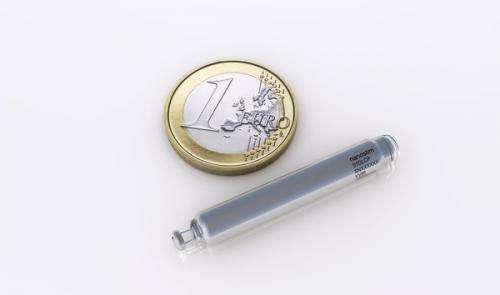St. Jude Medical gets European approval for first wireless pacemaker

St. Jude Medical Inc. has received European approval to market the first pacemaker that does not require implanted wires to attach to the heart.
The first-of-a-kind device was developed by California-based startup Nanostim with funding from St. Jude. The St. Paul, Minn.-based device maker also said it would acquire of the smaller company for more than $123 million under a previously negotiated option agreement between the companies.
Shares of St. Jude climbed in morning trading Monday after the company made its announcement.
Pacemakers are battery-powered medical implants that help the heart maintain a steady heartbeat. The devices have traditionally been implanted through a surgical procedure that creates a small pocket in the chest for the device and its wires, called leads, which attach to the heart.
The new Nanostim pacemaker is implanted directly into the heart using catheter-based procedure, which St. Jude says is less intensive than traditional surgery. The pacemaker's battery is designed to last between nine and 13 years. The new device is expected to soon launch in some European countries, the company said in a statement.
St. Jude is still expected to start trials of the device in the U.S. next year, which are required before seeking approval from the Food and Drug Administration.
"Although today's news was largely expected, the Nanostim device represents potential upside to our current St. Jude pacemaker estimates," Wells Fargo analyst Larry Biegelsen said in a note to investors. Biegelsen said the worldwide market for the new device is about $680 million, according to St. Jude. Biegelsen holds an "outperform" rating on the company's shares.
St. Jude has been plagued in recent years by recalls of lead wires with its other leading product, defibrillators, which deliver electrical jolts to correct dangerous irregular heartbeats.
The device maker stopped selling its Riata leads in late 2010 because of evidence that the silicone coating on the wires could wear and break down over time, increasing the chance a defibrillator could malfunction and either deliver a shock when none is needed, or fail to shock the patient's heart when it is not beating properly. It recalled the wires in late 2011.
Last November, the FDA released an inspection report of the Sylmar, Calif., facility where St. Jude manufactures its defibrillators and other heart devices. The inspectors noted a number of problems with the company's testing procedures, indicating staffers were not following their own quality-control guidelines.
Shares of St. Jude Medical Inc. rose 61 cents, or 1.1 percent, to $55.77 in morning trading Monday. The stock had already risen about 53 percent so far this year, as of Friday's market close.
© 2013 The Associated Press. All rights reserved.
















